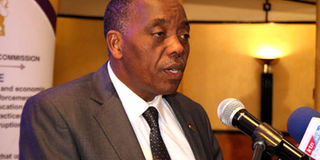Kinyua announces new measures to stop wastage in ministries

Head of Public Service Joseph Kinyua. PHOTO | FILE | NATION MEDIA GROUP
What you need to know:
Directors will be required to declare their residences and vehicles to curb fake mileage claims.
At the same time, Mr Kinyua has capped board expenses at not more than Sh30 million annually.
Equally, they have been excluded from field and inspection trips as well as international engagements, now a domain of the chief executives.
Mr Kinyua also noted that a number chief executive officers have been acting for more than six months, contrary to the legal requirement.
The government has issued a fresh list of austerity measures aimed at stopping wastage of resources in State corporations.
In a confidential memo to the Attorney-General, all Cabinet secretaries, principal secretaries and State corporations on Wednesday, Head of Public Service Joseph Kinyua outlined strict measures that could see the National Treasury save billions of shillings, money that ordinarily ends up in the pockets of corrupt civil servants in the name of allowances and other inflated claims.
Henceforth, mileage claims by board members will only be reimbursed against authenticated and registered car logbooks.
The vehicle must either belong to the member or spouse or a company in which the member’s shareholding is not less than 50 per cent plus one to curb cases of fictitious claims, says the memo. And such claims are capped at 1,800cc engine capacity to discourage the use of fuel guzzlers.
“For this purpose, all board members shall be required to declare their residence from which they commute while attending to board business at the time of appointment and upon any change thereafter,” it says.
Such claims must not exceed Sh35,000. Anything beyond must get the approval of the State Corporations Advisory Committee (SCAC) and the line minister.
The measures, Mr Kinyua said in the memo, were necessitated by the numerous complaints to his office relating to abuse as well as the ongoing investigations by the Ethics and Anti-Corruption Commission (EACC). The CEO of EACC Twalib Mbaraka was also sent a copy.
“The key areas relate to integrity issues arising from the frequency of board meetings, payment of allowances, and mileage claims, as well as additional prescriptions to enhance performance and compliance. These concerns buttress the emphasis of probity in the manner in which State corporations conduct their business.
“Consequently, your attention is drawn to the following directives and guidelines,” Mr Kinyua writes.
He directs that board meetings shall be restricted to a minimum of four as provided in the State Corporations Act and capped at a maximum of six for each financial year or as may be specified in the enabling legal instruments. The same principle will apply to committees of the boards.
“Consequently, chief executive officers must ensure thorough preparation of board papers and relevant documentation to facilitate efficient meetings. Approval of extra board meetings (including special board meetings) above the maximum number specified shall require a justification by the board as to the source of funds, and implication thereof, and reasons why the same cannot be adjudicated in regular meetings, which request shall be submitted for approval by the relevant Cabinet secretary, in consultation with the SCAC,” he says.
And to avoid a situation where the boards whimsically come up with activities for the sake of getting allowance or capital-intensive projects, all board members are required to submit their annual Almanac to the SCAC through the parent ministry by June 30 of every year for approval.
Also, to eliminate conference costs, where officials collude with hotels to inflate the rates in return for kickbacks, Mr Kinyua further directs them to transact all board business, including committee meetings, at the principal office or registered offices of the corporation.
“Board retreats are to be approved by the respective Cabinet secretary,” reads the circular. Most boards prefer high-end hotels for their frequent retreats.
Board committees, another avenue for minting allowances, has also been cited.
“The board may constitute an ad hoc committee to deal with emerging issues that require focused attention and which do not fall in the domain of the regular board committees. Such must have clear terms of reference and a limited lifespan.
“The number of members to such committees shall be no more than one-third of the full board. Further, members can only sit in a maximum of two committees.”
Board chairpersons are not allowed to sit in such committees. The same applies to members of the audit committee, save for those who represent the National Treasury or parent ministry when it comes to composition of the Finance committee.
And the committee members cannot serve beyond 12 months. Thereafter, they are rotated.
At the same time, Mr Kinyua has capped board expenses at not more than Sh30 million annually.
Equally, they have been excluded from field and inspection trips as well as international engagements, now a domain of the chief executives.
Mr Kinyua also noted that a number chief executive officers have been acting for more than six months, contrary to the legal requirement.
He directed the boards to appoint temporary holders where there are no acting CEOs by Wednesday next week and work on getting substantive holders within six months.
“Where the board is unable to source an acting replacement from within the agency, the chairperson shall consult the respective Cabinet secretary to select a suitable officer from within the ministry who shall be seconded to the state corporation and appointed by the board,” he states.





